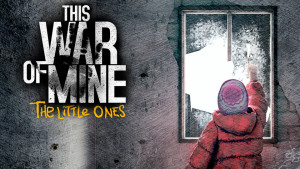By Craig Taylor | The Duquesne Duke

“This War of Mine” originally saw release on Nov. 14, 2014. “The Little Ones” adds several new features and a wider platform release.
Giving players a brutal, unforgiving look into the struggles of war on the home front, “This War of Mine: The Little Ones” is a great expansion on the original game.
Inspired by the Siege of Sarajevo during the Bosnian War, it centers around the desperation and difficult decisions civilians face when they must fend for themselves. Players must survive by any means necessary and sacrifices must be made, whether that be personally, communally or morally.
Although “This War of Mine” originally premiered on PC in 2014, Polish developer 11 bit studios has released a new version for Playstation 4 and Xbox One, titled “The Little Ones.” In what was already an emotionally tolling game, the heartstrings are tugged even further by adding kids. Trying to maintain a child’s innocence amidst the surrounding despair adds another level of complexity to a game that’s so good at drawing out genuine feelings and manipulating them.
The game begins on Day 1 of the siege, where three survivors settle in a battered shelter in need of serious maintenance. There are some building materials in the immediate area, but a majority of items must be scavenged at nighttime. Resources are incredibly precious, so difficult decisions must be made early on, such as whether to build a stove to properly cook food or make a bed to get a good night’s sleep.
What must be built is often dictated by the needs of the survivors, and there are a number of ailments that can afflict characters. Things like sickness, hunger and depression all take time and resources to treat, so players must either prioritize the needs of a single survivor or the good of the shelter overall. This becomes even more complicated with kids involved. Time that should be spent building up defenses might instead go to playing with a child who’s lonely and afraid. Valuable medicines might also traded for a new toy to keep up a kid’s spirits. Impractical decisions like these are common, and it speaks to the game’s ability to create an emotional connection with the audience.
Although it’s tempting to spoil the children, efficient micromanagement is key to a settlement’s longevity, and wastefulness can prove deadly. Conflicts will inevitably arise, and “This War of Mine” asks players to make difficult ethical decisions. Is it worth wasting bandages on a lethally wounded survivor who’ll likely die anyway? Is it justifiable to rob a defenseless elderly man of his wife’s medication to save a friend who’s violently ill? While these decisions might seem like no-brainers in a regular video game, “This War of Mine” is designed to make players feel the weight of their choices.
By design, there’s no heavy-handed story in the game. There’s little characterization for the survivors, most of what happens is random, and no two people will have the same play-through. Players fill in the blanks and unconsciously craft their own narrative. The result of this is a deeper emotional attachment to what’s happening, and a greater understanding of the game’s themes of loss, sorrow and desperation.
While building up the shelter and micromanaging resources could be considered “fun” in the traditional video game sense, it’s not exactly addicting, and audiences certainly won’t walk away smiling. But “This War of Mine” is better viewed as an experience rather than a game. It’s an artistic accomplishment that pushes creative boundaries.
What makes “This War of Mine” so memorable is its absentee morality system. By design, it garners the emotional investment of the player and toys with it. It forces people to play differently and think with a survivor mentality, something that few other games successfully accomplish. Sure, it’s possible to play it with the same dignity audiences have grown accustomed to – just don’t expect to last long.
